|
|
|
Sort Order |
|
|
|
Items / Page
|
|
|
|
|
|
|
| Srl | Item |
| 1 |
ID:
120870


|
|
|
|
|
| Publication |
2013.
|
| Summary/Abstract |
In examining the diffusion of social and political phenomena like regime transition, conflict, and policy change, scholars routinely make choices about how proximity is defined and which neighbors should be considered more important than others. Since each specification offers an alternative view of the networks through which diffusion can take place, one's decision can exert a significant influence on the magnitude and scope of estimated diffusion effects. This problem is widely recognized, but is rarely the subject of direct analysis. In international relations research, connectivity choices are usually ad hoc, driven more by data availability than by theoretically informed decision criteria. We take a closer look at the assumptions behind these choices, and propose a more systematic method to asses the structural similarity of two or more alternative networks, and select one that most plausibly relates theory to empirics. We apply this method to the spread of democratic regime change and offer an illustrative example of how neighbor choices might impact predictions and inferences in the case of the 2011 Arab Spring.
|
|
|
|
|
|
|
|
|
|
|
|
|
|
|
|
| 2 |
ID:
061708
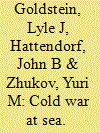

|
|
|
| 3 |
ID:
117630
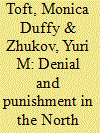

|
|
|
|
|
| Publication |
2012.
|
| Summary/Abstract |
A growing literature on the subnational diffusion of armed conflict rests on the proposition that political violence triggers more violence, in the same locality and elsewhere. Yet state efforts to contain such uprisings remain largely unexplored, theoretically and empirically. Drawing on a mathematical model of epidemics, we formalize the logic of conflict diffusion and derive conditions under which state coercion might limit the spread of insurgent violence. Using a new dataset of insurgent and government violence in Russia's North Caucasus from 2000 to 2008, we evaluate the relative effectiveness of four coercive strategies: (1) denial, which manipulates the costs of expanding insurgent activity to new locations, (2) punishment, which manipulates the costs of sustained fighting in contested areas, (3) denial and punishment, which does both, and (4) no action, which does neither. We find denial to be most effective at containing insurgent violence. Punishment is least effective, and even counterproductive. Not only does such a strategy fail to prevent the spillover of violence to new locations, but it may amplify the risk of continued fighting in contested areas. In the Caucasus, denial is found to be the least inflammatory counter-insurgency option for Russia. For it to succeed, Russia should physically isolate centers of insurgent activity from regions of nonviolence and avoid the temptation of punitive reprisals.
|
|
|
|
|
|
|
|
|
|
|
|
|
|
|
|
| 4 |
ID:
152229
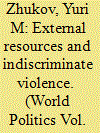

|
|
|
|
|
| Summary/Abstract |
Within a single conflict, the scale of government violence against civilians can vary greatly—from mass atrocities in one village to eerie restraint in the next. This article argues that the scale of anticivilian violence depends on a combatant's relative dependence on local and external sources of support. External resources make combatants less dependent on the local population, yet create perverse incentives for how the population is to be treated. Efforts by the opposition to interdict the government's external resources can reverse this effect, making the government more dependent on the local population. The article tests this relationship with disaggregated archival data on German-occupied Belarus during World War II. It finds that Soviet partisan attacks against German personnel provoked reprisals against civilians but that attacks against railroads had the opposite effect. Where partisans focused on disrupting German supply lines rather than killing Germans, occupying forces conducted fewer reprisals, burned fewer houses, and killed fewer people.
|
|
|
|
|
|
|
|
|
|
|
|
|
|
|
|
| 5 |
ID:
167285
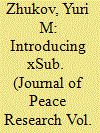

|
|
|
|
|
| Summary/Abstract |
Researchers today have access to an unprecedented amount of geo-referenced, disaggregated data on political conflict. Because these new data sources use disparate event typologies and units of analysis, findings are rarely comparable across studies. As a result, we are unable to answer basic questions like ‘what does conflict A tell us about conflict B?’ This article introduces xSub – a ‘database of databases’ for disaggregated research on political conflict (www.x-sub.org). xSub reduces barriers to comparative subnational research, by empowering researchers to quickly construct custom, analysis-ready datasets. xSub currently features subnational data on conflict in 156 countries, from 21 sources, including large data collections and data from individual scholars. To facilitate comparisons across countries and sources, xSub organizes these data into consistent event categories, actors, spatial units (country, province, district, grid cell, electoral constituency), and time units (year, month, week, and day). This article introduces xSub and illustrates its potential, by investigating the impact of repression on dissent across thousands of subnational datasets.
|
|
|
|
|
|
|
|
|
|
|
|
|
|
|
|
| 6 |
ID:
140169


|
|
|
|
|
| Summary/Abstract |
This article offers the first disaggregated, quantitative comparison of Islamist and nationalist violence, using new data from Russia's North Caucasus. We find that violence by Islamist groups is less sensitive to government coercion than violence by nationalist groups. Selective counterinsurgency tactics outperform indiscriminate force in suppressing attacks by nationalists, but not Islamists. We attribute this finding to rebels’ support structure. Because Islamist insurgents rely less on local support than nationalists, they are able to maintain operations even where it is relatively costly for the local population to support them. These findings have potentially significant implications for other contemporary conflicts in which governments face both types of challenges to their authority and existing political order.
|
|
|
|
|
|
|
|
|
|
|
|
|
|
|
|
| 7 |
ID:
186732
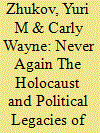

|
|
|
|
|
| Summary/Abstract |
Do individuals previously targeted by genocide become more supportive of other victimized groups? How are these political lessons internalized and passed down across generations? To answer these questions, the authors leverage original survey data collected among Holocaust survivors in the United States and their descendants, Jews with no immediate family connection to the Holocaust, and non-Jewish Americans. They find that historical victimization is associated with increased support for vulnerable out-groups, generating stable political attitudes that endure across generations. Holocaust survivors are most supportive of aiding refugees, followed by descendants, especially those who grew up discussing the Holocaust with their survivor relatives. An embedded experiment demonstrates the steadfastness of these attitudes: unlike non-Jews or Jews without survivor relatives, survivors’ and descendants’ views toward refugees do not change after reading an in-group versus out-group–protective interpretation of the “never again” imperative. Histories of victimization can play an ameliorative role in intergroup relations.
|
|
|
|
|
|
|
|
|
|
|
|
|
|
|
|
| 8 |
ID:
158216
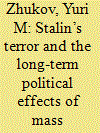

|
|
|
|
|
| Summary/Abstract |
Repression has a long-term negative effect on political participation. Using millions of arrest records from archival documents, and polling station-level election results, we examine how exposure to Stalin-era repression affects voter turnout in Putin’s Russia. To estimate the effect of repression on voting, we exploit exogenous variation in repression due to the structure of mid-century Soviet railroads, and travel distances to prison camps. We find that communities more heavily repressed under Stalin are less likely to vote today. The electoral legacy of Stalin’s terror – decades after the Soviet collapse, and across multiple election cycles (2003–12) – is systematically lower turnout. To show that our result is not unique to the Putin regime, we replicate our analysis in Ukraine (2004–14), and find similar patterns. These results highlight the negative consequences of repression for political behavior, and challenge the emerging view that exposure to violence increases political engagement. While past research has emphasized the short-term effects of repression over several months or years, we show that these effects may be durable over generations and even changes of political regime. Our findings also demonstrate that repression need not be collective or indiscriminate to have community-level effects.
|
|
|
|
|
|
|
|
|
|
|
|
|
|
|
|
| 9 |
ID:
144087


|
|
|
|
|
| Summary/Abstract |
If a government is facing an armed uprising, why doesn’t it confiscate all privately owned weapons? When and where is forcible disarmament most likely to occur? Can forcible disarmament reduce rebel activity? To establish a monopoly on the use of force, a government must either convince its citizens not to rebel, or remove their capacity to do so. Existing literature has left this choice – between punishment and disarmament – virtually unexplained. Most existing research focuses on disarmament in the context of post-conflict stabilization, rather than forcible disarmament during war. I introduce a mathematical model of irregular warfare, in which government and rebel forces seek a monopoly on violence. The model shows that disarmament occurs mainly in ‘hard cases’, where otherwise strong governments are unable to punish opponents or reward supporters. I test these claims with declassified archival data on counterinsurgency in the Soviet North Caucasus. The data confirm that disarmament was most likely where the government’s coercive leverage was limited – due to poor intelligence and potential backlash from collateral damage. In these otherwise challenging circumstances, disarmament significantly reduced rebel violence – short-term and long-term, locally and region-wide. By limiting the potential coercive resources under the opposition’s control, disarmament can render rebels unable to sustain a campaign of violence against the state.
|
|
|
|
|
|
|
|
|
|
|
|
|
|
|
|
| 10 |
ID:
165161


|
|
|
|
|
| Summary/Abstract |
Why do armies sometimes surrender to the enemy and sometimes fight to the bitter end? Existing research has highlighted the importance of battlefield resolve for the onset, conduct, and outcome of war, but has left these life-and-death decisions mostly unexplained. We know little about why battle-level surrender occurs, and why it stops. In this paper, we argue that surrender emerges from a collective-action problem: success in battle requires that soldiers choose to fight as a unit rather than flee, but individual decisions to fight depend on whether soldiers expect their comrades to do the same. Surrender becomes contagious across battles because soldiers take cues from what other soldiers did when they were in a similar position. Where no recent precedent exists, mass surrender is unlikely. We find empirical support for this claim using a new data set of conventional battles in all interstate wars from 1939 to 2011. These findings advance our understanding of battlefield resolve, with broader implications for the design of political-military institutions and decisions to initiate, continue, and terminate war.
|
|
|
|
|
|
|
|
|
|
|
|
|
|
|
|
| 11 |
ID:
089331


|
|
|
|
|
| Publication |
2009.
|
| Summary/Abstract |
Russia's intervention in the Georgian-South Ossetian conflict has highlighted the need to rigorously examine trends in the public debate over the use of force in Russia. Approaching this debate through the prism of civil-military relations, we take advantage of recent methodological advances in automated content analysis and generate a new dataset of 8000 public statements made by Russia's political and military leaders during the Putin period. The data show little evidence that military elites exert a restraining influence on Russian foreign and defence policy. Although more hesitant than their political counterparts to embrace an interventionist foreign policy agenda, Russian military elites are considerably more activist in considering the use of force as an instrument of foreign policy.
|
|
|
|
|
|
|
|
|
|
|
|
|
|
|
|
|
|
|
|
|